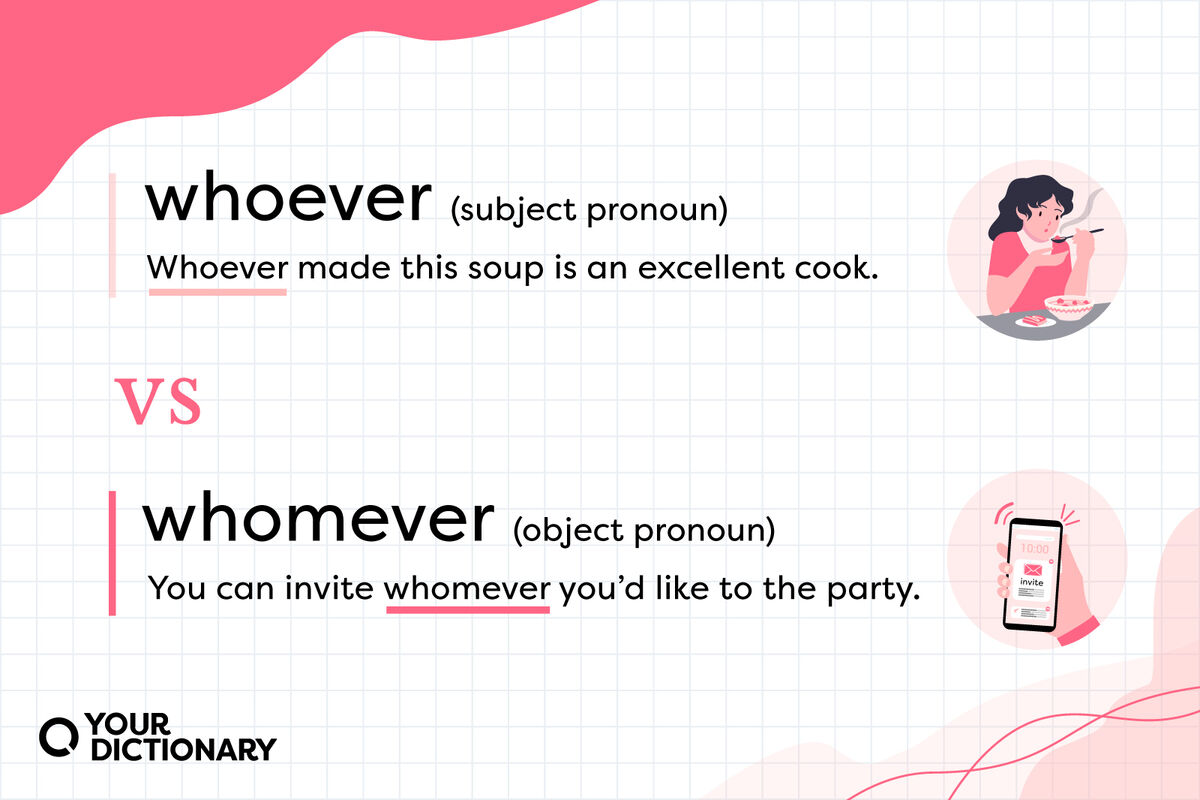
Isn’t whomever just a fancy version of whoever? Nope — so don’t slip whomever instead of whoever into your next essay or work email to sound impressive. Like who and whom, whoever and whomever are pronouns with a specific function in a sentence. You can’t use them interchangeably. (Maybe go do a quick grammar check in your latest document, just in case.)
How To Choose Between “Whoever” or “Whomever”
Both whoever and whomever are relative pronouns that introduce a noun clause (a dependent clause that functions as a noun).
We use them when we don’t know who we’re talking about — whoever and whomever describes an unknown, unnamed person.
- Whoever is a subject pronoun that performs the action.
(Whoever told the teacher about the fire is a hero.) - Whomever is an object pronoun that receives the action.
(Pedro will make a cake for whomever he chooses.)
Notice that the verb comes right after whoever in a sentence (Whoever told), but that there’s usually another noun or pronoun between whomever and the verb (Whomever he chooses).
Memory Tip for “Whoever” vs. “Whomever”
Like who and whom, the trick to telling whoever and whomever apart is the letter M.
Both him and whomever are object pronouns and have M’s in them. If you can replace the word whomever with him in the noun clause, you’ve used it correctly.
Example: You can invite whoever/whomever you want to the concert.
- Correct: You can invite him. (Use whomever)
- Incorrect: You can invite he.
If you need to use he (a subject pronoun) to make the sentence correct, you should use whoever.
Example: Whoever/whomever owns the black Lexus needs to move it.
- Correct: He owns the black Lexus. (Use whoever)
- Incorrect: Him owns the black Lexus.
“Whoever” Is a Subject Pronoun
Whoever (like who) functions as a subject pronoun within a noun clause.
- Whoever spread that rumor is a liar.
(Whoever performs the verb spread) - Whoever needs the last piece of pizza can have it.
(Whoever performs the verb needs)
Examples of “Whoever” in a Sentence
Whoever may appear in different places in a sentence, but as long as it’s performing an action and introducing a longer noun clause, you’re using it correctly.
- Whoever gets to the restaurant first should put our name on the list.
- Please tell whoever finishes their meal last to meet us at home.
- Whoever wants to go to the store should get in the car now.
- I’ll support whoever wins the election.
- Whoever wants the last piece of pizza can have it.
“Whomever” Is an Object Pronoun
Whomever is also a relative pronoun that introduces a noun clause, but it’s not as common as whoever. It functions as the object in the noun clause — the word that receives the action. The noun clause functions as a subordinate clause.
- You should thank whomever you like.
(You performs the verb like; whomever is the object) - Please give these keys to whomever Mr. Potter hired.
(Mr. Potter performs the verb hired; whomever is the object)
Examples of “Whomever” in a Sentence
So when do you use whomever in a sentence? Use it anytime someone else is performing the action, or when another noun or pronoun comes between whomever and the verb.
- Harry should give the award to whomever he believes deserves it.
- I impress whomever I encounter.
- The writer dedicated his book to whomever he met during the publication.
- I’ll interview whomever you send into my office.
- The political party nominates whomever they believe will win the election.
Using “Whoever” and “Whomever in Questions
Like whoever and whomever, who and whom can function as interrogative pronouns (although much less commonly than who and whom). They ask questions to learn someone’s identity.
Some examples include:
- Whoever ate the chocolate doughnut?
- Whomever does this dog belong to?
- Whoever will be the next president?
If these questions sound a little awkward, try substituting them with the more conversational who and whom. Whoever and whomever are best used as interrogative pronouns when you want to emphasize that you don’t know who the person is.
When To Use “Who/Whom” or “Whoever/Whomever”
All four pronouns indicate that the speaker does not know the identity of the subject or object of a sentence. Who and whom function to determine a specific person’s identity, while sentences with whoever and whomever put more emphasis on the verb and less focus on the person’s identity.
For example:
- Alice knows who pulled the fire alarm.
- Alice knows whoever pulled the fire alarm.
The first sentence emphasizes that Alice knows the identity of a person who pulled a fire alarm. Using whoever in the second sentence creates the noun clause “whoever pulled the fire alarm,” putting more focus on Alice’s relationship with this person. The difference is subtle but necessary for proper grammar usage.
Whoever vs. Whomever Quiz
Can you decide whether whoever or whomever is the best choice in each sentence?
- (Whoever/Whomever) reaches the finish line first is the winner.
- Deena always goes out with (whoever/whomever) asks her first.
- I’m so mad that I’ll fight with (whoever, whomever) I see first.
- Be sure to greet (whoever, whomever) walks into the store.
- Offer a free sample to (whoever, whomever) you greet.
- (Whoever/whomever) finds my missing bracelet will be my hero.
Answer Key for Whoever vs. Whomever Quiz
Deciding between whoever and whomever isn’t as easy as it looks. How did you do?
- (Whoever/
Whomever) reaches the finish line first is the winner. - Deena always goes out with (whoever/
whomever) asks her first. - I’m so mad that I’ll fight (
whoever, whomever) I see first. - Be sure to greet (whoever,
whomever) walks into the store. - Offer a free sample to (
whoever, whomever) you greet. - (Whoever/
whomever) finds my missing bracelet will be my hero.